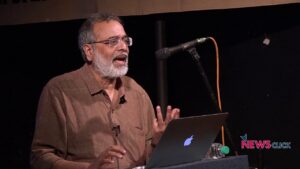Profit Trumps People And Planet In Brazil’s Eucalyptus Industry
 Brazil is set to unleash several varieties of genetically engineered eucalyptus, which will worsen a bad situation.
Brazil is set to unleash several varieties of genetically engineered eucalyptus, which will worsen a bad situation.
Valued for its termite-resistant wood for building purposes, pulp to create products like writing and toilet paper, and its oil, which has numerous health and household benefits, the eucalyptus tree generates big business worldwide. Native to Australia and Tasmania, the prehistoric tree has been planted in such volumes that eucalyptus plantations cover some 25 million hectares around the globe—larger than the entire land area of the United Kingdom. By 2028, according to forecasts, the global eucalyptus oil market is projected to exceed $213 million, while the worldwide market for eucalyptus pulp will expand to nearly $17 billion.
But the eucalyptus industry has a dark side. Eucalyptus plantations growing in regions spanning South America, southern Africa, southern Europe, and Australia have significant detrimental impacts on local communities and biodiversity. Communities located near eucalyptus plantations are likely to face water shortages—as these plantations utilize huge amounts of water—and pollution from agrochemicals, including exposure to glyphosate, which has been linked to various health problems, including increased cancer risk.
In addition, the presence of eucalyptus trees’ leaves and roots hinders the growth of other plants beneath them because they contain a biocidal oil that inhibits the survival and decomposition of most soil bacteria that come into contact with them.
Brazil is the world’s largest eucalyptus producer. With an estimated 7.6 million hectares of eucalyptus plantations, Brazil maintains 30 percent of the world’s total eucalyptus trees. In eastern Brazil, particularly in the states of Bahia and Espírito Santo, these plantations have replaced the diverse and endemic Atlantic Forest ecosystem, with some municipalities seeing nearly three-quarters of their land area being covered by eucalyptus plantations. Large corporations such as Suzano, Fibria, and Veracel dominate this industry, exporting eucalyptus as pulp for manufacturing products like toilet paper.
New Forest Threat: Genetically Engineered Eucalyptus
Genetically engineered (GE) varieties of eucalyptus trees are poised to exacerbate a new wave of ecological and social destruction. Brazil has approved seven varieties of genetically engineered trees. Current plantations rob regions of water, destroy wildlife habitat, and transform large swaths of land within the Cerrado—an expansive, biodiverse tropical biome situated in eastern Brazil—into unnatural, destructive monoculture farms: rows upon rows of non-native eucalyptus trees without vegetation in their understory. Many traditional communities and Indigenous people have opposed the spread of these plantations in the country.
Varieties of GE eucalyptus are pesticide-resistant and are likely to increase the use of toxic chemicals such as Roundup, the glyphosate-based weedkiller developed by Monsanto in the 1970s, which is the world’s most used herbicide—and was acquired by Bayer in 2018. Other engineered traits, such as increased growth rates, could make the trees more profitable for the pulp and paper industry but significantly more harmful to the environment.
International Opposition to GE Eucalyptus
The Campaign to STOP GE Trees is an international alliance of organizations working to halt the introduction of genetically engineered trees into the natural environment to prevent ecological destruction and harm to local communities. It is an initiative of our U.S.-based organization, Global Justice Ecology Project (GJEP), with support from the Uruguay-based World Rainforest Movement, which advances the cause of social justice in the forests.
An international delegation of the campaign, which was organized by GJEP, traveled to Brazil in July 2023 to meet with Indigenous and quilombola communities (descendants of escaped Afro-Brazilian enslaved people), members of the Landless Workers’ Movement (Movimento dos Trabalhadores Rurais Sem Terra, or MST, in Portuguese), government ministries, and academics. The delegation’s goal was to learn about the history of resistance against the pulp and paper industry in the country and discuss how herbicide-resistant genetically engineered varieties of eucalyptus trees could increase the use of toxic herbicides and amplify ecological degradation, health impacts, and social injustice.
FASE (Federação de Órgãos para Assistência Social e Educacional), a group that has been supporting communities opposing eucalyptus plantations for a decade, organized the logistics of the delegation, which included representatives from Argentina, Canada, Chile, Ireland, Japan, New Zealand, and the United States. Local representatives joined the delegation as it visited several Brazilian ministries to register official demands and testimonies from quilombola and MST community members from northern Espírito Santo and southern Bahia about the devastating impacts of eucalyptus plantations as well as new threats posed by GE eucalyptus trees.
“The demands that we recorded were from several MST communities that we met with that are doing important agroecological work and have a whole agroecological school training people in the region about how to grow organically,” said Anne Petermann, international coordinator of the Campaign to STOP GE Trees. She noted that “there were also statements from members of traditional quilombola communities in that region who are suffering, very directly, the impacts of eucalyptus plantations.”
The delegation also officially presented petitions from Rainforest Rescue, an environmental nonprofit based in Hamburg, Germany, signed by more than 100,000 people opposing the release of GE eucalyptus in Brazil to the ministries and Brazilian National Technical Commission on Biosafety.
During the delegation’s official meeting, Moisés Savian, secretary of Brazil’s Ministry of Agrarian Development, identified corporate interests driving the push for GE eucalyptus.
“It makes no sense in my vision to have a transgenic [eucalyptus] associated with glyphosate,” stated Savian. His comments highlighted the increasingly ubiquitous and dangerous as well as probable cancer-causing herbicide Roundup. “It is much more linked to market interests of the corporations that want to sell herbicide,” the secretary noted.
The Kafkaesque Incentive of Carbon Credits
Another motivation behind the push for GE eucalyptus is the Kafkaesque incentive of receiving carbon credits for planting trees. Corporations like Suzano—which has been called the “world’s largest pulp exporter”—can be rewarded for planting enormous industrial tree monocultures—since they are technically planting trees, they are eligible for carbon credits—even though they first clear-cut and remove the carbon-dense native forests, which release vast amounts of carbon from the forest and the soil.
The pulp industry in Brazil has accelerated the growth rate of their eucalyptus trees. This is increasing the already enormous demands on water resources. So problematic is the expansion of eucalyptus monocultures on the hydrology and biodiversity of regions that they are often called “green deserts.”
“They look green from a distance but are extremely fast-growing trees planted in perfect rows and columns optimal for mechanical harvesting. The huge plantations do not harbor wildlife, and the only biodiversity you find in them is ants and termites,” explained Petermann, who led the delegation that traveled to Brazil.
One of the most insidious trends in false solutions to climate change is the idea that living or biological carbon can offset fossil fuel carbon. An expanding landscape of monoculture industrial tree plantations in Brazil—which rob the forests of biodiversity, displace communities and wildlife, and deplete regions of water resources—epitomizes the eco-swindle of carbon credits.
João, a member of a quilombola community, told the delegation that when eucalyptus started being planted in Espírito Santo and Bahia, “they removed the native plant cover and all the nutrients from the soil. People [here] used to do agroforestry, would use cover crops, [and would] let the land rest—but now, with eucalyptus, there is no rest for the soil.” The total eucalyptus plantation area in Bahia is estimated to be about 658,000 hectares, positioning it as the country’s third-largest contributor to industrially cultivated eucalyptus.
Dr. Ricarda Steinbrecher, a biologist from the University of London who attended a forum hosted by the delegation, warned of unintended consequences of genetically engineered trees, stating that “the risks of GE trees is extremely high in terms of the impact on biodiversity, the people living around it, and the global ecosystem and climate.”
Not only are current eucalyptus plantations destructive, but the premise that they are superior to natural forests for capturing carbon is also unsound. In 2020, experts published a letter with the Institute of Physics stating that “forests are superior to, and irreplaceable by, plantations as agents of terrestrial C [carbon] sequestration.” They are harvested with incredibly short growing cycles for pulp and paper production, which releases the carbon back into the atmosphere. But the scheme is profitable for Suzano and other pulp companies since they profit from the production of pulp and paper as well as carbon credits for planting trees.
Belém Declaration
Brazil is home to numerous biomes, the most famous of which is the Amazon forest. Known as “the lungs of the Earth” for the massive amounts of carbon dioxide the forest inhales and the oxygen it exhales, the Amazon is the focus of many conservation initiatives and agreements.
In early August 2023, Brazilian President Luiz Inácio Lula da Silva hosted the Amazon Summit in Belém, the capital of the Brazilian state of Pará, during which another conservation agreement was launched. The eight nations party to the Amazon Cooperation Treaty (ACT) released the Belém Declaration, a document aimed to unify the shared objectives of the signatory nations, which are focused on preserving the Amazon and the rights of Indigenous people who live in it. The United Nations Climate Change Conference (COP30 ) is slated to meet in Belém in 2025.
In a press release, however, the Center for International Environmental Law (CIEL) stated that the Belém Declaration fell short of commitments to end deforestation in the Amazon and failed to address the issues related to the continued use of fossil fuels.
Nikki Reisch, director of CIEL’s Climate and Energy Program, stated:
“The Belém Declaration does not commit… to ending deforestation by 2030, or to addressing the primary, intersecting drivers of rainforest loss—industrial agriculture and the extractive and destructive industries that expose primary forests to land conversion.”
“Glaringly absent from the declaration is any mention of the threat that continued production and use of oil and gas poses to the Amazon and the ecosystems, communities, and climate that depend on it. Instead, exploration and development of new oil and gas projects continue—even at the mouth of the Amazon itself—directly undercutting leaders’ pledges to prevent the region from reaching the point of no return. Allowing expansion of fossil fuel extraction in the Amazon is incompatible with human rights, including Indigenous Peoples’ rights, biodiversity protection, and climate goals.”
Similar deference to industry interests plagues the Cerrado, where eucalyptus plantations and agribusiness continue to run roughshod over Indigenous and traditional communities and destroy a lesser-known but equally precarious natural ecological system regardless of ostensible ecological concerns and overtures.
The Demand for Paper Pulp
As the global demand for paper pulp continues to climb, Brazil is expected to be the site of the most significant expansion of these production facilities in South America.
Two regions that the Campaign to STOP GE Trees’ delegation visited are likely to face the negative impacts of the tremendous growth of eucalyptus plantations to feed the pulp and paper industry.
Quilombola communities the delegation met with stated that in Espírito Santo, most of the municipal land has been turned into plantations by Suzano. They also explained that tax incentives and infrastructure investment in the Três Lagoas region by local and federal governments seek to attract investments by the pulp and paper industry to the state of Mato Grosso do Sul, where much of the native Cerrado forest has been converted to eucalyptus plantation in the past decade.
It is so lucrative that Suzano is building the world’s largest pulp and paper mill in Mato Grosso do Sul. The enormous facility is being built by 10,000 workers, most of whom are stacked in nearby man camps. The mill is expected to employ 10,000 people when completed. The Cerrado Project, as Suzano has deemed it, is in a rural town that has a population of nearly 25,000. The project threatens grave environmental damage to natural habitat and biodiversity, water and air, and a devastatingly precipitous population influx.
Additionally, the Chilean corporation Arauco is planning an even larger mill in Mato Grosso do Sul after the scheduled completion of Suzano’s behemoth.
Robbing Land From Indigenous Communities
Land sovereignty of traditional communities has been a politically charged issue in Brazil, and the encroachment on lands belonging to traditional and Indigenous communities by agribusiness was a theme that the delegation heard repeated during its travels through Brazil, including in the affected areas of Espírito Santo, southern Bahia, and Mato Grosso do Sul. Born out of Brazil’s colonial past and decades of military dictatorship, land distributions in the country are highly inequitable. Agribusiness interests have been incredibly aggressive in the past and continue with this trend currently.
“What made us lose our land, our culture, was all those persecutions by agribusiness,” stated José De Souza, an instructor at the Indigenous Ofaié school in Mato Grosso do Sul. The Ofaié was “once a large people,” he said, noting that such agribusiness pressures almost made “them extinct.” Once having a population of tens of thousands, the Ofaié now live on a mere 45 hectares after being forcibly relocated twice. “It’s not an ended thing,” said Souza. “They destroyed our forests and water.” The school where Souza teaches emphasizes Ofaié culture and language in classes often taught outside in the open. The Ofaié land is small but is an oasis of native forest hemmed in by vast stretches of industrial monoculture plantations.
The Struggle for Land: The MST
Eucalyptus is as central to the Ofaié land struggle as it is to the MST, one of the most significant movements in South America. The group has nearly 2 million members, with hundreds of thousands of Brazil’s poor living in MST camps as farmers. The MST seeks to reverse Brazil’s profound inequality of land distribution by occupying land for communal farms.
The movement is a lightning rod of controversy in Brasilia, with lawmakers aligned with former Brazilian President Jair Bolsonaro trying to outlaw the movement. Still, judges have often accepted the MST’s interpretation of Brazilian law that allows unproductive land to be taken. The MST has occasionally included eucalyptus plantations as meeting the definition of “unproductive” and has occupied and repurposed them for communal farms.
The movement has been so successful in its occupation strategy that it is estimated that 460,000 families now live in encampments started by the campaign. The MST is forward-leaning with an eye to the future with agroecology schools that teach how to grow crops and food using agroecological methods. They are now the largest exporters of organic rice in Latin America.
Biden Administration Funding Eucalyptus Expansion
As the MST, Indigenous people, and traditional communities in Brazil struggle against the spread of industrial eucalyptus plantations, the Biden administration is reportedly funding its expansion.
According to a June 2023 article on Mongabay, “Biden promised funds from the U.S. International Development Finance Corporation to conserve the Amazon and other critical Latin American biomes.” Yet according to findings published by Mongabay, the debt investment, if approved by Congress, will primarily “be funneled into mass-produced eucalyptus in Brazil’s Cerrado savanna.”
Mongabay reported that $50 million of the funding would go to Timberland Investment Group’s (TIG) plan to expand its “planted forest operations,” which located its newest office near Suzano’s Cerrado Project in Mato Grosso do Sul.
PL 490: Curtailing Indigenous Land Rights
During the delegation’s visit to Brazil’s capital, Brasilia, to meet with ministers and lawmakers, Indigenous peoples held a large demonstration to oppose a proposal, PL 490, a law its supporters claim would bring certainty and fairness to land disputes in Brazil. Opponents, however, argue that the proposal would actually reverse hard-fought gains by Indigenous communities to have their land rights officially recognized.
Proposed by Bolsonaro-aligned lawmakers, PL 490 would reset Indigenous land claims to October 1988—when the current Brazilian Constitution was adopted after the military dictatorship. Since the lands were taken during the dictatorship, this is a land-grabbing ruse by extractive industries seeking to deny claims of land rights by Indigenous groups and even to erase gains they had made in the past. The Lower House of Congress gave its approval to this bill in May 2023.
The push for PL 490 underscores how land sovereignty is a fundamental issue in Brazilian politics and is inextricably linked to the country’s environment and the rights of traditional communities. Monoculture eucalyptus plantations play a central role in the contest over land rights, an issue central to Brazilian politics and ultimately connected to the rights of traditional communities and the world’s environmental health. With the specter of eucalyptus trees engineered for pesticide resistance and the Biden administration’s embrace of false solutions to climate change, the balance is being further tipped in favor of the pulp and paper industry in that fight.
“As Brazil goes, so does the world when it comes to the use of GE-engineered eucalyptus,” said Petermann. “The significance of the loss of the Cerrado to GE eucalyptus plantations cannot be overstated.”
Byline:
Steve Taylor and Orin Langelle
Author Bio:
Steve Taylor is the press secretary for Global Justice Ecology Project and the host of the podcast Breaking Green. Beginning his environmental work in the 1990s opposing clear-cutting in Shawnee National Forest, Taylor was awarded the Leo and Kay Drey Award for Leadership from the Missouri Coalition for the Environment for his work as co-founder of the Times Beach Action Group.
Orin Langelle is the director of Langelle Photography. His first assignment was photographing Vietnam War protests during the 1972 Republican National Convention in Miami Beach, Florida. He formally studied with Cornell Capa, former executive director of the International Center of Photography in New York. Langelle has photographed on six continents, worked in strategic communications, and co-founded Global Justice Ecology Project.
Source:
Independent Media Institute
Credit Line:
This article was produced by Earth | Food | Life, a project of the Independent Media Institute.




